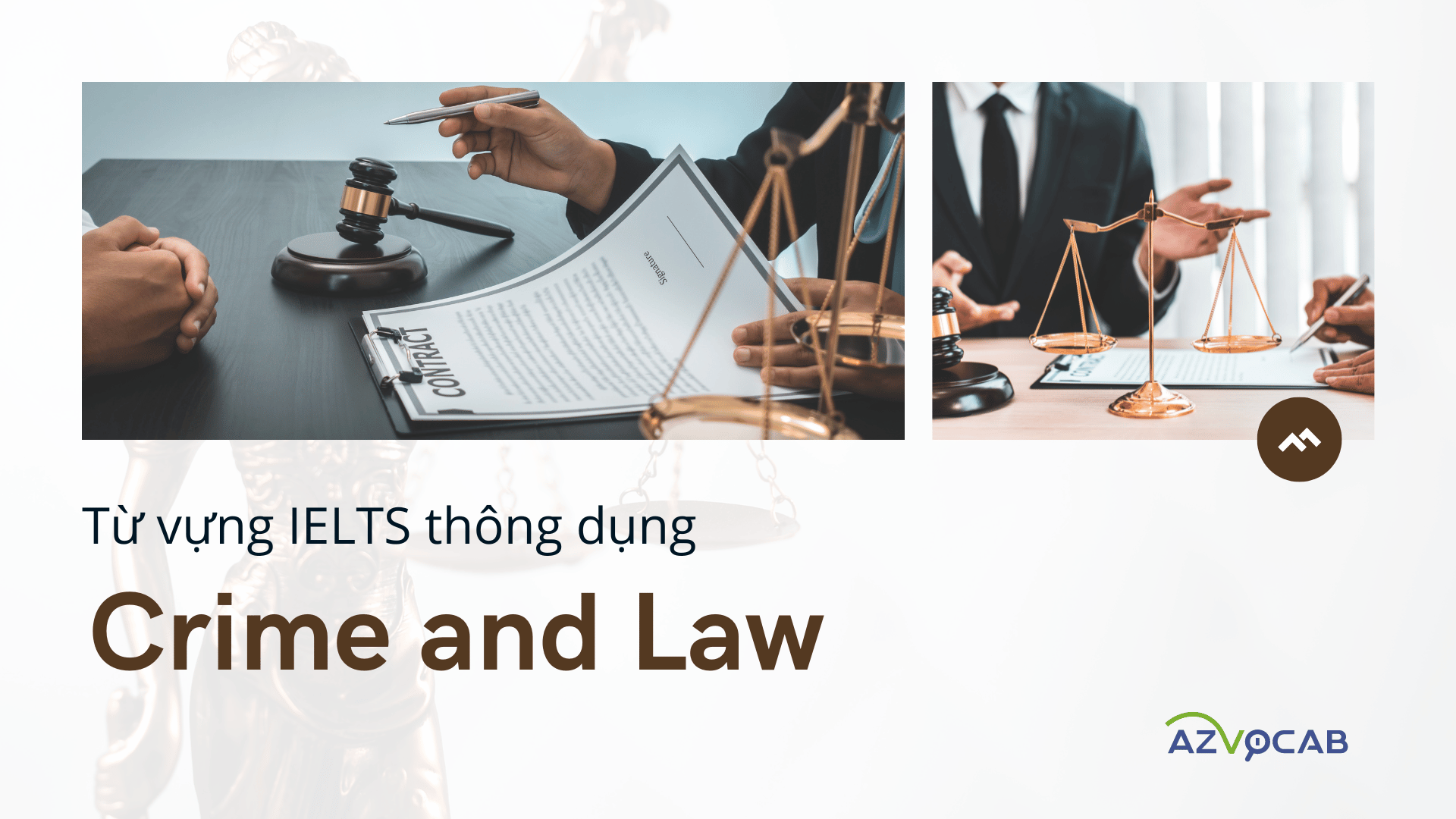70+ từ vựng chủ đề Business and Economics thông dụng cho kì thi IELTS
28 Tháng Mười Một, 2022Từ vựng IELTS thông dụng

Từ những bộ sách hay nhất cho việc ôn thi IELTS, azVocab đã tổng hợp được hơn 70 từ vựng phổ biến nhất thuộc chủ đề Business and Economics cho kì thi IELTS.
Các từ vựng này đều có thể sử dụng cho cả 4 kỹ năng Reading, Listening, Speaking và Writing. Những ví dụ được azVocab lựa chọn kĩ lưỡng trong từng ngữ cảnh cụ thể ở các bài thi IELTS. Điều này sẽ giúp các bạn biết cách sử dụng từ trong ngữ cảnh, tăng tính hiệu quả của việc học từ.
1. Từ vựng về các thuật ngữ kinh tế, kinh doanh
| sales representative (n.) – nhân viên kinh doanh | After the prospect has turned into a customer, the business card provides information for the customer to contact the sales representative to place further orders. |
| vendor (n.) – công ty cung cấp hàng hóa, dịch vụ | Our company deals with many vendors of women’s clothing. |
| managerial (adj.) – (thuộc) người quản lý, (thuộc) giám đốc; (thuộc) ban quản trị | Long-term employees are more likely to be promoted to a managerial position within a company. |
| bottom line (n.) – thu nhập ròng | How will the rise in interest rates affect our bottom line? |
| consumer (n.) – người tiêu dùng | The widespread awareness of the low-carb phenomenon has led many consumers to check food labels while trying to lose weight. |
| customer (n.) – khách hàng | The market demographics for tattoo services are now skewed heavily toward mainstream customers. |
| economics (n.) – ngành kinh tế, nền kinh tế | The problem isn’t only a matter of economics. There’s also technology to consider. |
| formulation (n.) – sự lên kế hoạch chi tiết | She is responsible for the formulation and implementation of marketing strategies. |
| household name (n.) – nhãn hiệu nổi tiếng | Running a company this size is never an easy task, and it’s only through sheer hard work and determination we’ve become the household name we are today. |
| luxury goods (n.) – xa xỉ phẩm | The government will pay for the new schools by increasing the tax on luxury goods. |
| dissatisfied (adj.) – không hài lòng | With social networking, it’s very easy for one dissatisfied customer to post on his or her blog that the company messed up. |
| disturbing (adj.) – đáng lo ngại | A disturbing trend for insurers has been a rise in fraudulent claims. |
| economic (adj.) – (thuộc) kinh tế | At home, parents can teach children how to stick to a budget. If a country experiences an economic crisis, these skills are invaluable. |
| economical (adj.) – tiết kiệm, có tính kinh tế | Taking a packed lunch to work can be a lot more economical than buying it every day. |
| fruitless (adj.) – vô ích, không có kết quả | All diplomatic attempts at a peaceful solution to the crisis have been fruitless. |
| hands-on (adj.) – thực tiễn; trực tiếp động tay vào | I employ over 2.000 staff, but I take a hands-on approach to management and so I keep track of how things are going in just about every department. |
| inevitable (adj.) – không thể tránh được | The failure of a small business is not inevitable if all the important pieces are in place. |
| monetary (adj.) – (thuộc) tiền tệ | As insurance became a profitable business, companies soon realized the monetary benefits of hiring men to extinguish fires. |
| persuasive (adj.) – có tính thuyết phục | In the eighteenth century, in colonial America, advertisements were most frequently announcements of available goods. but even in this early period, persuasive appeals accompanied dry descriptions. |
| profitable (adj.) – tạo ra lợi nhuận, đem lại lợi nhuận | Many credit card issuers, for example, choose not to deny a transaction that would put the cardholder over his or her credit limit; it’s more profitable to let the customer overspend and then impose penalties. |
| short-sighted (adj.) – (tầm nhìn) hạn hẹp | The management agreed to employ five more members of staff, which in hindsight was a very short-sighted decision because within a few weeks, we were still understaffed. |
| tremendous (adj.) – kinh khủng; dữ dội; trầm trọng | An economic crisis may have tremendous consequences for our global security. |
| ubiquitous (adj.) – ở khắp mọi nơi; tồn tại khắp nơi | In early modern Britain, one of the most characteristic forms of recycling has been the trade in second-hand clothing, which has survived to the present day in the shape of the ubiquitous charity shop. |
| unavoidable (adj.) – không thể tránh khỏi | Recession at the time seemed unavoidable. |
| up-and-coming (adj.) – đầy hứa hẹn | Up-and-coming enterprises in the small and medium-sized business sector must be strongly incentivised. |
| adjust (v.) – điều chỉnh | Advertisements, as historian Roland Marchand pointed out, sought to adjust Americans to modern life, a life lived in a consumer society. |
| aggravate (v.) – làm trầm trọng thêm, làm nặng thêm | The manufacture of polyester and other synthetic fabrics is an energy-intensive process requiring largo amounts of crude oil and releasing emissions which can cause or aggravate respiratory disease. |
| amalgamate (v.) – hợp nhất (công ty…) | Because it is a risk, we decided to amalgamate with a Chinese company. |
| assure (v.) – quả quyết; bảo đảm | The unions assured the new owners of the workers’ loyalty to the company. |
| create (v.) – tạo ra | A company creates a diverse product and pricing portfolio to meet the price range and needs of different customer segments. |
| cultivate (v.) – phát triển | In a recent study, SwindaJanda and collaborator Hong-Youl of South Korea’s Kangwon National University explored how businesses can cultivate and keep loyal customers and how relationships between businesses and customers are minor human relationships. |
| dominate (v.) – thống trị | Worldwide, the soft drinks market is totally dominated by just one or two big companies. |
| enhance (v.) – làm tăng; nâng cao | The study found that promotional events designed to counter customers’ negative attitudes can significantly enhance the customers’ likelihood of engaging in a long-term relationship with the business. |
| exploit (v.) – lợi dụng | Some companies consciously and cynically exploit their customers’ confusion in this way. |
| induce (v.) – thuyết phục | If we can increase the benefits of co-operation or the costs of defection, we can induce people to act in the group interest because it is also in their self-interest. |
| inform (v.) – cho biết, báo tin | Hotels, for example, often don’t reveal information about discounts and, along with car hire companies, fail to inform customers about possible upgrades. |
| invest (v.) – đầu tư | To solve these problems, governments can either focus on draconian punishments or improve employment opportunities, invest in good housing projects and tackle drug and alcohol abuse. |
| linger (v.) – chần chừ; kéo dài | An understanding of customer psychology is an invaluable aid for retailers looking for ways to increase sales. Much can be done to the store environment to encourage shoppers to linger longer and spend more money. |
| mislead (v.) – đánh lừa | The advertising campaign intentionally misled consumers about whether the product was natural. |
| mismanage (v.) – quản lý tồi | The restaurant was hopelessly mismanaged by a former rock musician with no business experience. |
| oblige (v.) – bắt buộc, cưỡng bách | Though the firemen were well paid, they were constantly on duty and thus obliged to call their fire station home for both themselves and their families. |
| tempt (v.) – xúi giục; cám dỗ | New employees may be tempted to take in too much responsibility when they first join a firm. |
2. Từ vựng về sự phát triển trong kinh tế, kinh doanh
| bankruptcy (n.) – sự phá sản | The company was forced into bankruptcy. |
| budget (n.) – ngân sách | Healthcare and education are both essential services that can be extremely expensive and as a result, unaffordable for those on a limited budget. |
| consistency (n.) – tính kiên định, nhất quán | Brand loyalty is about the consistency with which consumers buy a certain brand. |
| credit rating (n.) – xếp hạng tín dụng | Filing for bankruptcy is arguably the most extreme signal of financial distress,’ said the researcher. Not only is it bad for creditors, but it also seriously harms a filer’s credit rating, affecting the availability and cost of future loans.’ |
| cutback (n.) – sự cắt giảm (chi tiêu…) | If things don’t improve soon, I’ll be forced to make cutbacks in that department. |
| distributor (n.) – nhà phân phối | For the past twenty years, they have been the country’s leading distributor of household appliances. |
| equity (n.) – vốn chủ sở hữu | The researchers found that mid-level lottery winners did not ill fact pay off their debt or increase equity in existing assets. |
| expense (n.) – phí tổn | Nowadays many elderly people struggle to meet their everyday living expenses. |
| hurdle (n.) – chướng ngại vật | The enormous cost of this programme is a major hurdle that we need to overcome. |
| increase (n.) – sự tăng lên | The globalizers doubled their annual GDP over this period and there was also an increase in the GDP of the non-global countries, while the wealthy countries fell to three percent per year. |
| manufacturer (n.) – nhà sản xuất | The other company was looking for an exporter and we were looking for a local manufacturer, so a win-win situation, really. |
| money (n.) – tiền | As a student, I had barely any money, just enough for a few things l really needed. |
| online retailer (n.) – nhà bán lẻ điện tử | In terms of online retailers, in order to enhance customer loyalty, they should focus on enhancing customer perceptions of their trustworthiness. |
| productivity (n.) – năng suất, hiệu suất | So it is not surprising that farmers are turning to genetically modified crops to try to boost productivity. |
| rebate (n.) – tiền hoàn thuế | Promotions that don’t focus on a hard-sell approach but rather on providing relevant information such as the availability of rebates for the customer. |
| retail (n.) – việc bán lẻ | Tattooing today is the sixth fastest-growing retail business in the United States. |
| share (n.) – cổ phần; phần đóng góp | I would like to increase my income so I’m going to invest in some shares. |
| trade (n.) – thương mại, việc mua bán | When Europeans opened up the fur trade in North America in the 17th century, the French traders used larger canoes to transport furs in large quantities across the Great Lakes for shipment back to Europe. |
| bankrupt (adj.) – vỡ nợ, phá sản | Despite a promising start, it looks like the company will soon be bankrupt. |
3. Từ vựng về quảng cáo, tiếp thị trong kinh doanh
| advertisement (n.) – quảng cáo | In the eighteenth century, in colonial America, advertisements were most frequently announcements of available goods, but even in this early period, persuasive appeals accompanied dry descriptions. |
| advertising (n.) – việc quảng cáo | Usually, advertising attempts to persuade its audience to purchase a product or a service. |
| billboard (n.) – bảng quảng cáo | There are some really large billboards along the motorway as you come into town. |
| branding (n.) – việc xây dựng thương hiệu | The branding of Western Wats as Opinionology resulted in the creation of the biggest market-research company in the world. |
| campaign (n.) – chiến dịch | I’ve recently been promoted and now I’m in charge of several advertising campaigns. |
| flyer (n.) – tờ rơi | There’s a street I walk down every day and the walls are plastered with flyers for new bands and events. |
| gimmick (n.) – mánh lới quảng cáo | They give away free gifts with children’s meals as a marketing gimmick. |
| jingle (n.) – nhạc quảng cáo | On the radio, I heard this jingle for a new toothpaste and it’s one I’ve heard a lot and I couldn’t get the tune out of my head after that! |
| market (n.) – thị trường | Large overseas companies have control over the non-alcoholic drink market. |
| marketing (n.) – tiếp thị | Ong of the most influential propositions in marketing is that customer satisfaction means loyalty and loyalty means profits. |
| slogan (n.) – khẩu hiệu | The goal of advertisers is to produce a slogan that people remember and use on a regular basis – promoting brand awareness well outside the original advertisement. |
| catchy (adj.) – bắt tai; dễ nhớ | The common practice at that time was for copywriters to think up an appropriate and perhaps catchy text to attract the attention of the buying public. |
| telemarketing (n.) – tiếp thị qua điện thoại | When asked about attitudes towards different forms of advertising, consumers rated interruptive or intrusive formats such as telemarketing and spam email as most annoying. |
| irritating (adj.) – gây bực mình | A telephone call with an automated telemarketing message is equally irritating whether we classify it as advertising or sales effort. |
| promotional (adj.) – (thuộc) quảng cáo (để bán hàng..) | The study found that promotional events designed to counter customers’ negative attitudes can significantly enhance the customers’ likelihood of engaging in a long-term relationship with the business. |
| ploy (n.) – mánh khóe, thủ đoạn | Many competitions are simply a marketing ploy to help boost sales. |
| entice (v.) – dụ dỗ, lôi kéo | Department stores often use smells and sounds to entice shoppers into their stores. |
Trên đây azVocab đã tổng hợp từ vựng chủ đề Business and Economics thông dụng cho kì thi IELTS. azVocab đã chia nhỏ chủ đề để giúp các bạn học từ một cách dễ dàng hơn. Hãy theo dõi bài tổng hợp từ vựng thông dụng theo 18 chủ đề thường gặp cho kì thi IELTS để học thêm từ vựng ở các chủ đề khác nữa nhé.





